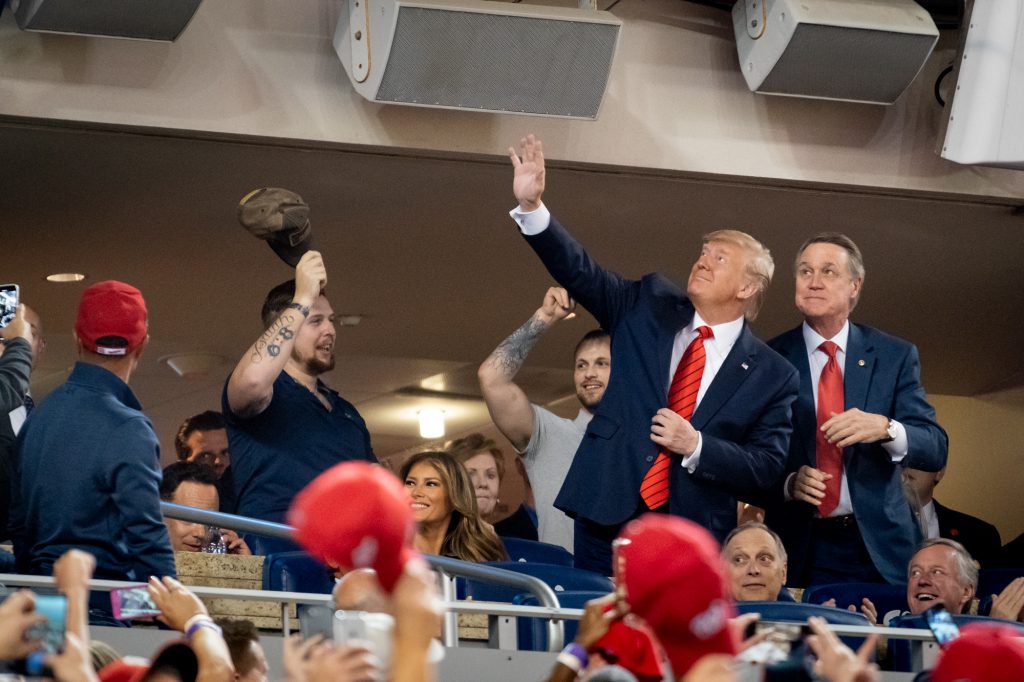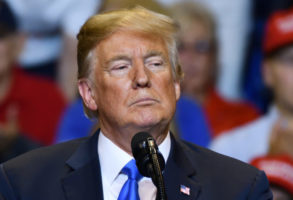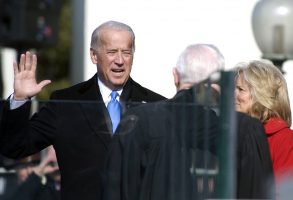
Published October 29, 2019
After the third inning of Sunday’s Game 5 of the World Series, while sitting in a luxury suite, President Donald Trump was introduced to a sold-out crowd at Nationals Park. The announcement was met with a cascade of boos—hitting almost 100 decibels—and chants of “Lock him up!” and “Impeach Trump!” Behind home plate, veterans for impeachment signs were unfurled.
It was a rare, uncontrolled setting for the president, who has avoided such Washington events as the Kennedy Center Honors and the White House Correspondents’ Association Dinner.
Now we know why.
Despite being one of the earliest and fiercest critics of the president, I tweeted out supportive words for Democratic Senator Chris Coons, who told CNN’s John Berman, “I’m enough of a sort of traditionalist about our institutions—even when there’s a lot that our president does that I find disturbing, offensive, unconventional. I have a hard time with the idea of a crowd, on a globally televised sporting event, chanting ‘Lock him up!’ about our president.” Coons added, “I frankly think the office of the presidency deserves respect even when the actions of our president at times don’t.”
Based on the reaction on my social-media account and elsewhere, many Trump critics were having none of it. They seemed to think that Trump was reaping what he had sowed. The fans at Nats Park were speaking truth to power. Trump dehumanizes others; he deserves to be put in his place. Turnabout is fair play. Being proper and polite is for losers. Bullies such as Trump deserve to be bloodied on the playground. It’s not “sinking to his level. It’s turning his own weapons against him,” one user responded to my tweet. People need to stand up to “a criminal, a liar, a bigot, a fool, a con man,” wrote another. “So sick of taking the high road with this guy and his fans. Where has the high road gotten the country since he took office?” asked a third.
These are fair objections. So what are the counterarguments?
Maybe the place to start is by building on the point made by Coons. The institution of the presidency is not synonymous with the occupant of the office, and there’s something worthwhile in keeping them distinct.
We frequently conflate individuals with institutions. The latter are viewed as simple extensions of the former, a stage on which to perform, something to be exploited for personal gain and glory.
But Donald Trump, though he is president, does not define the presidency. It predated him, it will outlast him, and one day again voters can choose an American president as an expression of their highest ideals rather than of their basest instincts.
That doesn’t mean the president is above criticism, of course. It means only that in certain circumstances, now and then, we should show respect for the office rather than disdain for the officeholder. There’s no book we can pull off the shelf to tell us what those circumstances are; it’s a matter of intuition and judgment. Some of us believe that when a president is introduced at the World Series, it’s worth thinking institutionally more than individually. More than enough institutional wreckage is going on just now. It would be helpful if more of us didn’t contribute to it, even in small ways.
But there’s more to it than that. Today partisan politics is seeping into every nook and cranny of American life. There are virtually no areas fenced off from politics, no sectors free from polarization, no partisan-free zones. We don’t need the World Series to become part of the culture wars. At some point, we need places of repose.
At the dawn of the Trump presidency, Andrew Sullivan made this incisive point:
One of the great achievements of free society in a stable democracy is that many people, for much of the time, need not think about politics at all. The president of a free country may dominate the news cycle many days—but he is not omnipresent—and because we live under the rule of law, we can afford to turn the news off at times. A free society means being free of those who rule over you—to do the things you care about, your passions, your pastimes, your loves—to exult in that blessed space where politics doesn’t intervene. In that sense, it seems to me, we already live in a country with markedly less freedom.
We need Trump in particular—and politics more generally—to dominate less, not more, of our national life.
Yet another reason to believe the crowd’s reaction on Sunday night was unfortunate is found in Michelle Obama’s advice during the 2016 Democratic National Convention: “When they go low, we go high.” If you believed that the “Lock her up!” chants at Trump rallies in 2016 were contemptible, then “Lock him up!” chants in 2019 aren’t something you want to encourage. Imitating what you loathed is generally a bad idea.
In addition, if Trump critics think that they’re going to win a race to the bottom with him—that they can out-insult, out-lie, out-curse, and out-offend the president—they’re wrong. Their narrative should be the restoration of integrity, dignity, and decency to the presidency.
Spontaneous boos interspersed with “Lock him up!” chants—lasting all of 30 seconds or so—during a single baseball game hardly constitute a crisis. This moment will soon be forgotten by almost everyone. But it’s perhaps worth recognizing that this wasn’t a one-off, an isolated occurrence. It was a fairly innocent manifestation of a worrisome trend.
We’re caught in a downward spiral of antipathy and enmity. Trump is the individual most responsible for this ugly state of affairs. But those of us who oppose him shouldn’t act in ways that unnecessarily create more hostility, more friction, and less understanding. We need to find ways to calm our passions rather than to inflame them.
We need to find ways to create more temperate zones.
I readily acknowledge that it’s not self-evident where the line lies that divides harsh but warranted criticisms of President Trump from criticisms that are injurious to our political culture. I’ll admit, too, that I reacted to the booing and “Lock him up!” chants at the World Series in the context of a growing conviction: In this time of extraordinary mutual contempt, we need more people, myself included, to model civic grace. That doesn’t mean withholding tough, even at times scorching, criticisms of Trump. Speaking truth about those who abuse power and target the weak and vulnerable is a noble undertaking.
Civic grace means that each of us should look for places to act in our daily lives with a touch more class, a bit less venom, and a little more understanding toward those who see the world differently than we do. That we look for places to affirm others rather than go in search of more people to tear down. Sometimes it might mean offering a healing word in a divided world. Other times it might mean acknowledging through our silence that the presidency deserves respect even when the actions of our president at times don’t.
Even at a baseball game.
Peter Wehner, a senior fellow at the Ethics and Public Policy Center, served in the last three Republican administrations and is a contributing editor at The Atlantic and a contributing opinion writer for the New York Times. He is also an Egan Visiting Professor at Duke University.





